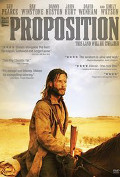
Directed by
John Hillcoat
104 minutes
Rated MA
Reviewed by
Bernard Hemingway

The Proposition
The Proposition is a persuasive, engaging film but it is not as good as most critics would have you believe.This is because Nick Cave’s script doesn’t quite take it beyond its generic parameters.
The story is set in Australia during the late 1800s. Captain Morris Stanley (Ray Winstone) who has been brought from England to bring order to the lawless land is in pursuit of the three Burns brothers who recently murdered a family of settlers. When he captures two of them, Charlie (Guy Pearce), and Mikey (Richard Wilson) he offers Charlie freedom for himself and his slow-witted brother if Charlie will find and kill Arthur (Danny Huston), the eldest brother and ring-leader. If not, he will hang Mikey on Christmas Day in nine days hence.
To his credit, Cave, best-known as a song-writer of Biblically-portenteous songs (one of his most-admired albums is called ‘Murder Ballads’) endows his characters with contradictory qualities. Captain Stanley initially appears to be a sadistic bully (some might think of Gene Hackman’s sheriff in 1992’s Unforgiven) but he is devoted to his wife (Emily Watson) and believes so entirely in his civilizing mission that it is undermining his health. Charlie, cornered by Stanley’s proposition is torn between irreconcilable obligations to his brothers whilst Arthur is a psychopath but nevertheless an intelligent and exceptionally well-read one. Adding to the mix are more straightforward characters such as David Wenham’s mayor (a real sadist), John Hurt’s Shakespearean reprobate and Tom Budge’s nasty little henchman.
The story of how all the characters interconnect in Australia’s arid colonial Outback is a compelling one particularly thanks to Benoît Delhomme superb cinematography, Chris Kennedy’s telling production design and John Hillcoat’s robust directing nevertheless it doesn’t completely convince. This, I would hazard a guess, is principally because the character of Charlie isn’t given enough attention and as he is the main protagonist this leaves the film with a certain hollowness at its centre. Compare Charlie with Captain Willard in Apocalypse Now (1979), as both men on a mission to terminate a renegade who has gone beyond the pale of civilization, and you see how little we understand of Pearce’s Charlie.
As we briefly see Noah Taylor in the shoot-out which effectively opens the film, but never again, perhaps there was more of Charlie’s story that got left on the cutting room floor. As it is we don’t know why or how he became an outlaw, what he has done and why and when he has split from Arthur’s rabid gang. The implication is because of some kind of moral revulsion. But whether this was before or after the rape and murder of the settlers we are not told (one leans to “before” in order to establish Charlie’s inherent sense of decency).
Also problematical is that as we have seen from their previous collaboration Ghosts… of the Civil Dead (1989) Cave and Hillcoat have a taste for graphic violence which they indulge here to unnecessary excess. Distancing themselves from this, something which is done very effectively with Watson’s character, would have given the film a greater sense of credibilty.
There is much to admire In The Proposition despite the fact that it falls somewhat short of being entirely endorsable.
FYI: It is a pity that Cave and Hillcoat couldn't have benefitted from The Assassination Of Jesse James By The Coward Robert Ford (2007) for which Cave and Ellis would also do the music with its telling mix of genre entertainment and psychological insight.
Want something different?





